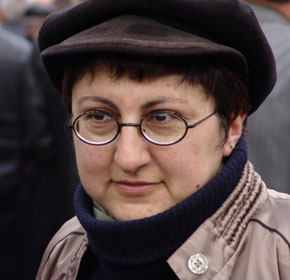By Marine Petrossian
The Turkish border has come closer to my home. Or to put it another way, now I realize more clearly how close it is to my home. I write these words sitting at my desk, in my apartment at Arabkir district of Yerevan. Ararat mountain is in my rear on the left. Stepanakert is in my rear on the right. Baku is much far away but on the same line — Yerevan-Stepanakert-Baku. Ankara is on my left, to the north, far away. My ancestors’ town Sepasdia is much closer. They form a line: Yerevan-Sepasdia-Ankara. This is the same line that ends with Baku in the East. The line was always there but up to yesterday it was kind of in the mist of history. Now the mist is gone. And the history came back to shoot us with newest weapons.
The above were my thoughts written some two months ago, at the beginning of October. The war had just started. We were absolutely sure we were going to win. And then we lost the war. We lost it badly. I remember the day when we got the news that the Azerbaijanis had taken Shushi. It was November 9, and it was the spokesman for Artsakh’s president who wrote about this on his Facebook page. Impossible to believe! Most of my friends were asking on Facebook — Maybe the spokesman’s page has been hacked? Maybe it is a fake page? But the spokesman soon confirmed it was his posting. And then, late at night, came the terrible news about the joint statement signed by Prime Minister Pashinyan together with the Russian and Azerbaijani presidents: we were ceding to Azerbaijan not only all seven districts around Nagorno Karabakh proper, taken during the war of the 1990s as the belt of its security; not only the city of Shushi, a gate to Stepanakert; but also Hadrut that had never been mentioned in any resolution plan before, being part of Nagorno Karabakh proper.
Were we in a nightmare dream? No, it was a reality, not а dream. Pashinyan posted a Facebook live message, telling us he had to sign the statement otherwise after losing Shushi we would lose also Stepanakert and the rest of Artsakh, and all of our troops could be surrounded and destroyed by Azerbaijanis.
Today, when I write this, more than three weeks have passed since the signing of capitulation statement, and there have been some shocking revelations. It turns out that our prime minister, long ago before the war started, was well aware that Azerbaijan with Turkey were planning an attack; he was also well aware that Armenian military resources were not enough to withstand that attack. And knowing all this, instead of being active in Minsk Group negotiations to find a solution through compromise, he did exactly the opposite: he created a deadlock, announcing that negotiations had to start “from zero point.”
Why, Nikol, why did you do that?










